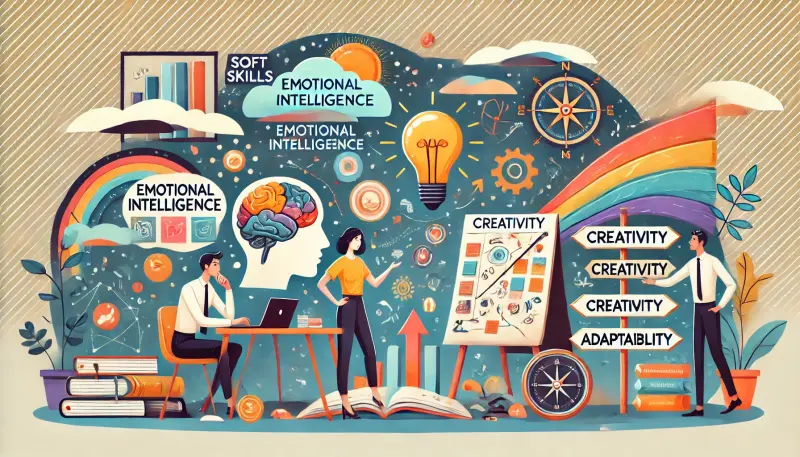How to Develop "Soft" Skills for Career Growth: Emotional Intelligence, Creativity, and Adaptability
In today's fast-paced and ever-changing professional environment, technical expertise is no longer enough to guarantee career success. While hard skills (such as knowledge of specific tools, technologies, or methodologies) are essential, they must be complemented by what are commonly known as "soft skills." These include emotional intelligence, creativity, adaptability, and a range of other interpersonal and cognitive abilities that allow individuals to navigate complex workplace dynamics, innovate, and thrive in uncertain conditions.
Soft skills are increasingly viewed as the key differentiators in hiring and career progression. According to a report by the World Economic Forum, by 2025, more than 50% of all employees will require "reskilling," with the demand for soft skills only growing. As a result, professionals are increasingly focusing on developing these abilities to stay competitive in the job market.
This article will explore how to develop three critical soft skills—emotional intelligence, creativity, and adaptability—that can elevate your career and help you succeed in a rapidly changing world.
Emotional Intelligence: The Foundation of Strong Relationships and Leadership
Emotional intelligence (EQ) refers to the ability to recognize, understand, and manage one's own emotions, as well as the emotions of others. In the workplace, high emotional intelligence is crucial for building strong interpersonal relationships, fostering collaboration, and leading effectively.
There are five key components of emotional intelligence:
-
Self-awareness: The ability to recognize and understand your own emotions and how they affect your thoughts and behavior. Being self-aware helps you make better decisions, communicate more effectively, and avoid rash actions.
-
Self-regulation: The ability to manage your emotions in healthy ways, especially during stressful or challenging situations. Self-regulation allows you to stay calm under pressure, think clearly, and maintain a positive attitude, even in the face of adversity.
-
Motivation: The drive to achieve goals for reasons beyond external rewards, such as personal satisfaction or passion. Motivated individuals are often more resilient, persistent, and goal-oriented.
-
Empathy: The ability to understand and share the feelings of others. Empathy allows you to connect with colleagues, clients, and stakeholders on a deeper level, fostering trust and cooperation.
-
Social skills: The ability to manage relationships, influence others, and work well in teams. Social skills are essential for building rapport, resolving conflicts, and leading groups toward common goals.
How to Develop Emotional Intelligence
Developing emotional intelligence is not an overnight process; it requires intentional practice and self-reflection. Here are some steps you can take to enhance your EQ:
-
Practice mindfulness: Mindfulness exercises, such as meditation or journaling, can help you become more self-aware by allowing you to observe your emotions without judgment. Regular mindfulness practice can help you understand your emotional triggers and develop better control over your responses.
-
Seek feedback: One of the best ways to improve self-awareness is by asking for feedback from others. Encourage colleagues, mentors, or friends to provide constructive criticism about how you handle emotions in different situations. This feedback can help you identify areas for improvement.
-
Focus on active listening: To develop empathy and improve your social skills, practice active listening. This means fully concentrating on the speaker, understanding their message, responding thoughtfully, and remembering what was said. By listening attentively, you show respect for others' emotions and perspectives.
-
Manage stress: Learning to handle stress is crucial for emotional regulation. Regular exercise, breathing exercises, or engaging in hobbies can help you manage stress levels. When you feel emotionally overwhelmed, take a step back to regain composure before reacting.
-
Build meaningful connections: Spend time building positive, supportive relationships with colleagues. Take the time to understand their emotions, motivations, and challenges. Strong, trusting relationships are the foundation of emotional intelligence and leadership.
Creativity: Innovation and Problem-Solving in the Workplace
Creativity is often perceived as an inherent talent—something you either have or you don’t. However, research shows that creativity is a skill that can be nurtured and developed. In the modern workplace, creativity is essential for problem-solving, innovation, and finding new ways to improve processes, products, and services.
Creative individuals are not only able to generate original ideas but also think critically about how to implement those ideas effectively. This includes developing novel solutions to challenges, approaching problems from different angles, and embracing experimentation and failure as part of the learning process.
How to Foster Creativity
Here are some strategies to enhance your creativity and become a more innovative thinker:
-
Encourage curiosity: Creativity begins with curiosity. Make it a habit to ask "why" and "what if" questions. Explore different perspectives, challenge assumptions, and seek new experiences. By embracing curiosity, you open yourself up to new ideas and possibilities.
-
Create space for creativity: Whether it's taking a walk, brainstorming with colleagues, or experimenting with new tools, make time and space for creative thinking. Sometimes, the best ideas come when you allow your mind to wander freely without constraints.
-
Embrace failure as a learning opportunity: Fear of failure can stifle creativity. Instead, embrace mistakes as valuable learning experiences. Every failure provides insights that can lead to better solutions in the future.
-
Collaborate with others: Creativity thrives in environments where people from diverse backgrounds and perspectives work together. Collaboration allows you to share ideas, refine concepts, and generate solutions that you may not have come up with on your own.
-
Engage in creative exercises: Participate in activities that stimulate your creative thinking, such as brainstorming sessions, mind mapping, or taking part in workshops. These exercises help you develop new ways of thinking and approaching challenges.
